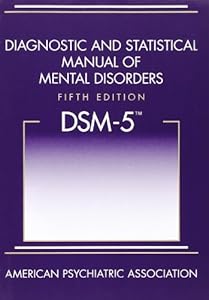
The Diagnostic and Statistical Manual of Mental Disorders is the standard reference for psychiatry in the US. It contains over 400 known mental health and psychological disorders affecting both adults and children. Inside you'll find the names and symptoms of disorders, as well as known/potential causes, treatments, and statistics. You should be able to find a copy at your local library. The DSM-5 is an excellent resource for afflicting characters - and not just villains.
Some random entries:
- Dissociative fugue - unplanned travel or wandering, sometimes accompanied by the establishment of a new identity.
- Selective mutism (SM) - an anxiety disorder in which a person who is normally capable of speech cannot speak in specific situations or to specific people. (Exhibited by the character Raj on the TV show Big Bang Theory.)
- Dependent Personality Disorder - refers to "a pervasive and excessive need to be taken care of which leads to submissive and clinging behavior and fears of separation".
- Avoidant Personality Disorder - feelings of inadequacy, sensitivity to perceived negative evaluation by others, avoidance of social interaction. Individuals with APD usually describe themselves as anxious, lonely, unwanted and/or isolated.
Give us clues utilizing "show not tell". A person with OCD will have all sorts of rituals and routines to follow. Someone with APD will be hyper-sensitive, avoid relationships and intimacy, mistrust others, and escape into a comfort zone such as a fantasy world (such as video gaming). Some disorders may only manifest themselves at certain times; my Great Uncle took part in fighting at the Battle Of the Bulge, and thereafter reacted strongly to sudden loud noises (thunder, firecrackers, engine backfires, large objects being dropped).
Don't forget to include how the disorder affects those around him. Are others aware that there is a problem? Are they sympathetic or judgmental? How does it affect character interactions? Do they accept the person and the behavior(s), or try and change it?
A few of my favorite books dealing in some way with psychiatric/psychological/cognitive disorders:
- The Tale Of Samuel Whiskers or Roly-Poly Pudding by Beatrix Potter. (Tom Kitten develops a rat phobia.)
- Regeneration by Pat Barker. (Shell shock from WW1, now known as PTSD. Based on poet Siegried Sassoon's experiences.)
- Curious Incident Of the Dog In the Night-Time by Mark Haddon (autism)
- Sybil by Flora Rheta Schreiber (dissociative identity disorder, previously called multiple personality disorder)
- Girl, Interrupted by Susanna Kaysen (young adult experiences in a psychiatric hospital)
- Bleak House by Charles Dickens (Krook is a hoarder) and Dead Souls by Nikolai Gogol (Plyushkin syndrome became synonymous with collecting and hoarding useless objects/trash in Russia)
- The Alienist by Caleb Carr (historical fiction, advent of forensic psychiatry)
- Flowers For Algernon by Daniel Keyes (ethical/moral themes of superficially enhanced intelligence and mental disability)
Adjectives for the day: dapatical, decrepitate, desipient, diogenic, doctiloquent, dubitative
I tend to write about mental illness, so I bought the DSM IV a while back. It's definitely a useful reference guide. I'll probably get the 5th edition at some point!
ReplyDeleteIt's pretty expensive, which is why I use the public library's copy. :-)
DeleteI wrote a blog post a couple of months ago about writing about a character with a psychological or personality disorder. Characters with a disorder can really be fascinating, but it's important to do it right which involves a lot of research. :)
ReplyDeleteIt is very tricky, as you want to be accurate with the research and also portray character interactions as accurately as possible - which may mean dealing with awkward things like vocabulary and cultural norms of the times. (In the past, it used to be perfectly acceptable to refer to lunatics, hysterics, madhouses, feeble-mindedness, and imbeciles.
DeleteThat is a lot of disorders. A character could have subtle hints of one, like they are borderline.
ReplyDeleteTrue, And I believe that most people display, at one point or another, certain traits or characteristics of one disorder or another.
DeleteThese are great ideas for characters, thanks for sharing!
ReplyDeleteYou're welcome, thanks for stopping!
DeleteI love characters grounded in reality like real people which make great stories.
ReplyDeleteIt's so much easier for a reader to relate to characters who have real problems, thoughts and feelings.
DeleteInteresting. I've read many of those books. I once heard a poet speak about finding a book on phobias and starting a series of poems based on the different phobias.
ReplyDeleteRita visiting from A to Z 1896
I'd love to read that book! :-)
DeleteFugal states have been one of the most fascinating psychological events to me ever since I learned of them in high school. What a thing to become, even for a short period. What artist wouldn't want to know what the experience of lost time is like?
ReplyDeleteI suppose the closest I've come would be recovering from anesthesia - not knowing where I was, who anyone was, or how much time had passed. (It cleared up after an hour or two.)
DeleteI'd add A Spot of Bother, also by Mark Haddon, to your list of interesting books centering around characters with psychological disorders.
ReplyDeleteI will check it out, thank you!
DeleteI need to re-read that; I remember enjoying it in high school, but had forgotten it till you mentioned it. In doing a little research, I discovered that it was published 11 years after the author's (John Kennedy Toole) suicide, which i did not know. Thanks!
ReplyDelete